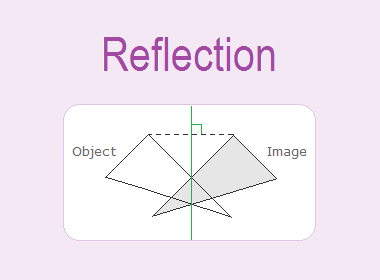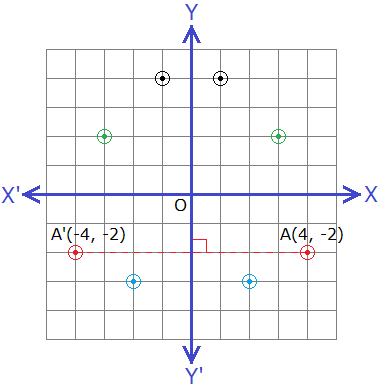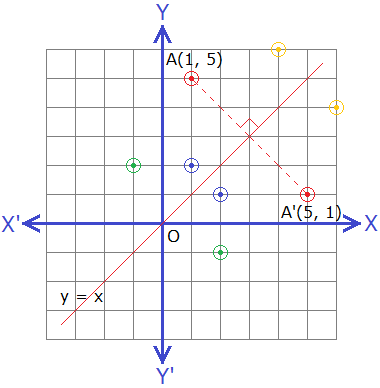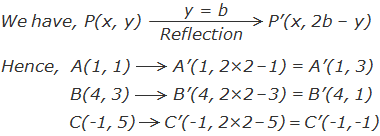
Reflection is a transformation that has a mirror image about a line as a two-way mirror. A line that plays the role of a two-way mirror to give the image of the given objects is called the axis of reflection.
********************
10 Math Problems officially announces the release of Quick Math Solver and 10 Math Problems, Apps on Google Play Store for students around the world.
********************
********************

The following are the properties of reflection:
a.
The object and the image
under the reflection are congruent.
b.
The object and the image will
be at equal distances from the axis of reflection.
c. The line joining the object and its image will be perpendicular to the axis of reflection.
Example 1: Find the image of a point P under the reflection over the line AB.

Solution:
To have the image of the point P under the reflection over the
line AB, we perform the following steps:
Step 1: Draw PO ⊥ AB.
Step 2: Produce PO upto P’ so that PO = OP’.

The point P’ is called the image of the point P under the
reflection over line AB.
Example 2: Find the image of quadrilateral PQRS under the reflection over the
line AB.

Solution:
Draw perpendicular from each vertex of quadrilateral PQRS on the
axis of reflection AB and produce the perpendicular line upto the point whose
distance from the axis of reflection is equal to the distance of its object
from the axis of reflection as in previous example and join P’Q’R’S’ to get the
required image.

Example 3: The image of triangle ABC under the reflection is triangle A’B’C’.
Find the axis of reflection.

Solution:
Complete the following steps for the axis of reflection.
Step 1: Join any vertex of triangle ABC with its corresponding image.
i.e. CC’. (We can join BB’ or AA’ instead)
Step 2: Draw perpendicular bisector of CC’, which is the line of axis
of reflection.

∴ MN is the line of axis of reflection.
Reflection Using Co-ordinates
The image of geometrical figures under the reflection over a line can easily be obtained with the help of co-ordinates.
Reflection about X-axis
Let A(3, 4) be a point and X-axis be the
axis of reflection. From point A draw AM⊥OX and produce AM upto A’ so that AM = AM’ then the co-ordinates
of the point A’ will be (3, -4) as shown in the figure.

Hence, A’(3, -4) is the image of the point A(3, 4) under the reflection about X-axis.

Let us see the following table of some
points on the plane and their corresponding images under the reflection about
X-axis.

From the above table, we can see that the
image of any point under the reflection about X-axis is obtained by changing
the sign of the y-coordinate of the image point. So we can conclude that the
image of a point P(x, y) under the reflection about X-axis is P’(x, -y).

Example 4: Find the image of ΔABC with vertices A(2, 3), B(5, 1) and C(3, 5)
under the reflection about X-axis. Draw the ΔABC and ΔA’B’C’ (image) on the
same graph paper.
Solution:
As the vertices of given triangle ABC are A(2, 3), B(5, 1) and
C(3, 5), the vertices of the image ΔA’B’C’ under the reflection about X-axis
can be obtained by using formula as follows:

Drawing ΔABC and its image ΔA’B’C’ on the same graph paper, we have the figure as shown.

Reflection about Y-axis
Let A(4, -2) be a point and Y-axis be the axis of reflection. From point draw AM⊥OY and produce it upto A’ such that AM = MA’, then the co-ordinates of point A’ will be (-4, -2) as shown in the figure.

Hence A’(-4, -2) is the image of the
point A(4, -2) under the reflection about Y-axis.

Let us see the following table of some
points on the plane and their corresponding images under the reflection about
Y-axis.

From the above table we can see that the
image of any point under the reflection about Y-axis is changing by the sign of
its x-coordinate from the given point. So we can conclude for the image of a
point P(x, y) under the reflection about Y-axis is P’(-x, y).

Example 5: Find the image of quadrilateral PQRS with vertices P(-4, 2), Q(-3,
4), R(1, 5) and S(-2, 1) under the reflection about Y-axis. Draw quadrilateral
PQRS and its image P’Q’R’S’ on the same graph paper.
Solution:
As the vertices of given quadrilateral P(-4, 2), Q(-3, 4), R(1, 5) and S(-2, 1), the vertices of the image P’Q’R’S’ can obtain by using the formula (or by drawing on the graph) as follows:

Drawing quadrilateral PQRS and its image P’Q’R’S’ on the same graph paper, we have the figure as shown.

Reflection About the Line y = x
Let, A(1, 5) be a point, and the line y = x be the axis of reflection, the line y = x is a line bisecting the angle between X-axis and Y-axis lying in the first and the third quadrant. Draw a perpendicular AM on the axis of reflection and produce it upto point A’ so that AM = MA’ then the co-ordinates of the point A’ will be (5, 1) as shown in the figure.

Hence A’(5, 1) is the image of the point
A(1, 5) under the reflection about the line y = x.

Let us see the following table of some
points on the plane and their corresponding images under the reflection about
the line y = x.

From the above table we can see that the image of any point under the reflection about the line y = x obtained by interchanging the x-coordinate and y-coordinate of the given point. So we can conclude for the image of a point P(x, y) under the reflection about the line y = x is P’(y, x).

Reflection About the line y = -x
Let A(-2, 5) be a point and the line y = -x be the axis of reflection. The line y = -x is a line bisecting the angle between the X-axis and the Y-axis lying in the second and fourth quadrant. From point A draw AM perpendicular on the line y = -x and produce it upto A’ so that AM = MA’, the co-ordinates of A’ is (-5, 2) as shown in the figure.

Hence A’(-5, 2) is the image of the point
A(-2, 5) under the reflection about the line y = -x.

Let us see the following table of some
points on the plane and their corresponding images under the reflection about
the line y = -x.

From the above table we can see that the
image of any point under the reflection about the line y = -x is obtained by
interchanging the x-coordinate and y-coordinate with opposite signs of the
given point. So we can conclude for the image of a point P(x, y)under the
reflection about the line y = -x is P’(-y, -x).

Example 6: Find the image of ΔPQR with vertices P(-2, 1), Q(2, 3) and R(-1, 5)
under the reflection about the line y = -x. Also draw ΔPQR and its image on the
same graph paper.
Solution:
The vertices of given triangle PQR are P(-2, 1), Q(2, 3) and
R(-1, 5). The co-ordinates of vertices of the image ΔP’Q’R’ under the
reflection about the line y = -x can be obtained by using formula as follows:

Drawing quadrilateral ΔPQR and its image ΔP’Q’R’ on the same graph paper, we have the figure as shown.

Reflection About the Line x = a
Let A(1, 2) be a point and the line x = 3 be the axis of reflection. The line x = 3 is a line parallel to Y-axis and at 3 units right from Y-axis. From point A draw AN perpendicular on the line x = 3 and produce it upto A’ so that AN = NA’, then the co-ordinates of A’ is (5, 2) as shown in the figure.

Hence A’(5, 2) is the image of the point A(1,
2) under the reflection about line x = 3.

Let us see the following table of some points on the plane and their corresponding images under the reflection about the line x = 3.

From above table we can see that the
image of any point under the reflection about the line x = a, is obtained by
changing the x-coordinate of the given point by 2a – x. So we can conclude for
the image of a point under the reflection about the line x = a.

Reflection About the line y = b
Let A(2, 1) be a point and the line y = 3 be the axis of reflection. From point A, draw AM perpendicular on the line y = 3 and produce it upto A’ so that AM = MA’, the co-ordinates of point A’ will be (2, 5) as shown in the figure.

Let us see the following table of some
points on the plane and their corresponding images under the reflection about
the line y = 3.

From the above table we can see that the
image of any point is obtained by changing the y-coordinate of the object by 2b
– y where b is the distance of the axis of reflection with direction from
X-axis. So we can conclude for the image of a point under the reflection about
the line y = b.

Example 7: A(1, 1), B(4, 3) and C(-1, 5) are the vertices of a triangle ABC,
find the co-ordinates of the vertices of the image ΔABC under the reflection
about the line y = 2.
Solution:
Here A(1, 1), B(4, 3) and C(-1, 5) are the vertices of given triangle. We can find the co-ordinates of the vertices of the image of ΔABC under the reflection about the line y = 2 by using formula.

∴ The co-ordinates of the
vertices of image ΔA’B’C’ are A’(1, 3), B’(4, 1) and C’(-1, -1) respectively.
Note: We can find these co-ordinates of image ΔA’B’C’ by drawing in
graph paper.
Conclusion About Reflection Using Co-ordinates:

Do you have any question regarding the reflection using co-ordinates?
You can comment your questions or problems here in below.



In Triangle ABC, A(4,4),B(2,3) and C(6,2). Reflect ABC at x=1 and y=-2 successively and find both image. Represent them in a graph sheet and mention the single transformation due to the combination of the above reflections
ReplyDeleteHere is the solution to your problem,
Delete[image src="https://blogger.googleusercontent.com/img/a/AVvXsEiylM9HeSsPSScUaPXHtUo1QtkjQiIKO9gdx0Fi0L8Fx216zhrlNvhWDoarBlPgV1KszlALhO-yjxoPHh6XBwWmBjoTj8hZ6lqZ35DNuHTvk1EVV0LrmgciKaQ1YMOnUyX8lmq7fgRhtAW4XzMHc_BMuQT7tLW1uImwgnC7uOWBShr5gMgJ31P2jKxCAA=s16000"/]
Draw a figure OABC with vertices O(0, 0), A(2,0).B(3,1) and C(4,4). The figure is transformed by translation vector AC⃗⃗⃗⃗⃗and drawn O'A'B'C'. Then after reflected on the line y=4. Draw both the object and image in the graph.
ReplyDeleteHere is the solution to your problem,
Delete[image src="https://blogger.googleusercontent.com/img/a/AVvXsEgznG57ExnMRxW3bS2yRF0dXxAsGY0niSnGrx0h_ODbqIQdqIjy5H44y5wa7XW_U0gsCVOAPsv606PKUCrjOESnokhc8UvTyGj1FKkJEKYRDGY4Ye3G-naW-urXXiGcMFx6gtj5vMlbpF8r24S0Ya38jHHWZ3idTWsxYEU1tXfDcMqdHBOiqhje3Kbukg=s16000"/]
Gooooo88e8888w8w8ooeorkfrk4oi3o3oe8ieerrroootrrrr4ee3rrŕror
ReplyDeleteP
P
Ppppppppppp
Pppppp
P
P
P
P
P
P
P